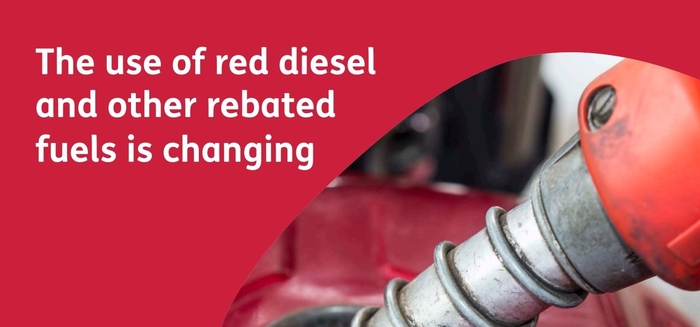HMRC has published interim guidance on changes to the use of rebated (red) diesel and other rebated fuels which were first announced in 2020.
The changes, which take effect from 1 April 2022, mean that most machines, vehicles and appliances will no longer be allowed to use rebated (red) diesel and only when used for specific purposes.
Red diesel is diesel currently used mainly for off-road purposes, such as to power bulldozers and cranes used in the construction industry, or to power drills for oil extraction. It accounts for around 15% of all the diesel used in the UK and is responsible for the production of nearly 14 million tonnes of carbon dioxide a year.
This change is being introduced because red diesel contributes to higher emissions, negatively impacting the climate. It will support the Government’s Build Back Greener initiative, highlighting a continued commitment to tackling climate change and improving the UK’s air quality.
Ambitious new strategy
In June 2019, the UK became the first major economy in the world to pass laws guaranteeing an end to its contribution to global warming by 2050. The target will require the UK to bring all greenhouse gas emissions to net zero by 2050, compared with the previous target of at least an 80% reduction from 1990 levels. In the same year the government also launched an ambitious new strategy to clean up the air and save lives, given air pollution is one of the biggest continuing threats to public health in the UK.
Removing most red diesel entitlements will also help to ensure that the tax system incentivises users of polluting fuels like diesel to improve the energy efficiency of their vehicles and machinery, invest in cleaner alternatives, or just use less fuel.
Some construction companies have already pledged to invest more in cleaner alternatives, such as green hydrogen, which will play a key role in the Government’s net zero ambition.
At Spring Budget 2021, the government confirmed that it would remove the entitlement to use red diesel and rebated biodiesel from most sectors to help meet its climate change and air quality targets. The tax changes will ensure that most users of red diesel use fuel taxed at the standard rate for diesel from April 2022, like motorists, which more fairly reflects the harmful impact of the emissions they produce.
Rebated fuels
The rebated fuels affected by these changes are rebated (red) diesel, rebated Hydrotreated Vegetable Oil (HVO), rebated biodiesel and bioblend, and fuel substitutes. HVO is a liquid hydrocarbon which is classified for excise purposes as heavy oil and treated the same as diesel.
Biodiesel, bioblend and fuel substitutes are already subject to fuel duty when they are set aside to be used in an engine, motor or machine. From 1 April 2022, they will also be liable to fuel duty if they are used for heating purposes. The rebated rate of fuel duty will apply when they are used for non-commercial heating, and the full rate of fuel duty will apply when they are used for commercial heating.
Switching to greener alternatives, where available, is strongly encouraged and may help to prevent businesses incurring additional expenses as well as benefiting the environment.




